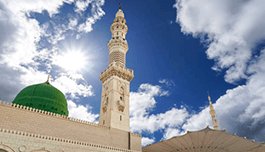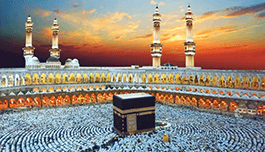Masjids are the houses of Allah on earth. He has commanded their construction so that He alone may be worshipped within them—His name remembered and His commands and prohibitions honoured. They serve as sacred spaces where His believing servants draw closer to Him through various acts of worship, such as prayer, remembrance and recitation of the Qur’an.
Allah has promised immense reward to those who build a mosque for His sake: a magnificent house will be prepared for them in Jannah, along with the everlasting reward of ongoing charity (sadaqah jariyah) which continues even after they have passed away. Every prayer, recitation, and remembrance within its walls adds to their good deeds—for as long as the mosque stands and people continue to benefit from it.
Benefit 1: Build a Masjid, Gain a House in Paradise
Among the greatest virtues of building a masjid is Allah’s promise of a house in Paradise—eternal, built by Allah Himself, and with architecture that is unimaginable and far superior to anything ever produced in this world. Numerous authentic narrations from the Prophet ﷺ and his Companions highlight this immense reward.
Hadith 1. Uthman ibn Affan reported: The Messenger of Allah (ﷺ) said, “Whoever builds a mosque for Allah, Allah will build for him a house like it in Paradise.” (Narrated by al-Bukhari (450), Muslim (533), al-Tirmidhi (318), Ibn Majah (736) and Ahmad (506)).
Hadith 2. ‘Umar ibn Khattab said: “I heard the Messenger of Allah (ﷺ) say: “Whoever builds a mosque in which Allah is remembered, Allah will build for him a house in Paradise.” (Narrated by Ibn Majah (735) in the chapter “One Who Builds a Mosque for The Sake Of Allah”, Ibn Hibban (1608) and Ibn Abi Shaybah (3157) with an authentic chain).
Hadith 3. ‘Ali ibn Abu Talib said: “I heard the Messenger of Allah (ﷺ) say, “Whoever builds a mosque for the sake of Allah from his own wealth, Allah will build a house for him in Paradise.'” (Narrated by Ibn Majah (737) with a weak chain).
Hadith 4. ‘Aisha said that she heard the Messenger of Allah (ﷺ) say, “Whoever constructs a mosque purely for the sake of Allah, without seeking praise or recognition, Allah will build for him a house in Paradise.” (Narrated by Al-Tabarani in “Al-Awsat” (7005). Classed as Hasan by Al-Mundhiri in Al-Targhib wa’t-Tarḥib (1/156)).
Hadith 5. Jabir ibn ‘Abdullah reported that the Messenger of Allah (ﷺ) said: ” Whoever digs a water well, from which any thirsty being — whether jinn, human, or bird — drinks, Allah will reward him on the Day of Judgement. And whoever builds a mosque for the sake of Allah, like a sparrow’s nest for Allah or even smaller, Allah will build for him a house in Paradise.” (Narrated by Ibn Majah (738) and Ibn Khuzaymah (1292). Al-Busiri said: “This chain of narration is authentic.”)
Hadith 6. Anas ibn Malik reported: “I heard the Prophet (ﷺ) say, “Whoever builds a mosque for the sake of Allah, whether small or large, Allah will build for him a house in Paradise.” (Narrated by Al-Tirmidhi (no. 319) and Abu Ya‘la (no. 4298). Ahmad Shakir said: “Its chain of transmission is weak.”).
Hadith 7. Abu Dharr reported that the Messenger of Allah (ﷺ) said: “Whoever builds a mosque for the sake of Allah, even if it is as small as a sparrow’s nest, Allah will build for him a house in Paradise.” (Narrated by Ibn Abi Shaybah (3155), Ibn Hibban (1610, 1611), Ishaq ibn Rahwayh (214), and Al-Bayhaqi (2/437). Al-Haythami said in Al-Majma’ (2/7): “Its narrators are trustworthy”).
The phrase ‘like a sparrow’s nest‘ indicates that the reward for building a mosque is not confined to large constructions, rather even the smallest mosque built sincerely for Allah’s sake will earn the builder a house in Paradise. The emphasis is on the intention and the act of building, not on the size or grandeur. In this hadith is also evidence that even small donations towards building a masjid carry a great reward.
Benefit 2: Earn Ongoing Charity That Continues After Death
Building a masjid is a powerful form of sadaqah jariyah—ongoing charity that benefits a person even after death. The reward of every prayer offered, every verse of the Qur’an recited and every word of dhikr uttered within the masjid adds to the person’s record of good deeds for as long as the masjid remains in use.
Abu Hurairah reported: The Messenger (ﷺ) said: “When a person dies, their deeds come to an end except for three: ongoing charity (sadaqa jariyah), beneficial knowledge, and a righteous child who prays for them.” (Narrated by Muslim (1631), Al-Nasa’i (3651), Abu Dawud (2880) and Al-Tirmidhi (1376)).
Abu Hurairah also reported that the Messenger of Allah (ﷺ) said: “Among the deeds and good deeds that follow the believer after their death are: knowledge they taught and spread; a righteous child they left behind; a Mushaf (copy of the Qur’an) they bequeathed; a mosque they built; a house they built for the wayfarer; a river they caused to flow; or charity they gave from their wealth while in good health and life—these deeds continue to benefit them after death.” (Narrated by Ibn Majah (242), Ibn Khuzaymah (2490) and al-Bayhaqi (3448)). Classed as Hasan by Al-Dimyati in “Al-Matjar Al-Rabeh” (23)).
Anas ibn Malik reported that the Messenger of Allah (ﷺ) said: “Seven deeds continue to bring reward to a servant while they are in their grave after death: teaching knowledge, digging a river, digging a well, planting palm trees, building a mosque, bequeathing a Mushaf (copy of the Qur’an), or leaving behind a child who prays for them.” (Narrated by al-Bazzar (7289), Ibn Hibban (2/181) and al-Bayhaqi (3449). Classed as Hasan li ghayrihi by Al-Albani in Sahih al-Targheeb (73)).
Benefit 3: Be Relieved from Hardship on the Day of Judgement
In many rural areas, Muslim communities often face significant hardship in accessing a masjid, sometimes travelling long distances and many kilometers to attend prayers. Building a mosque in such locations not only brings immense relief to these communities but also becomes a means for relief from hardship on the Day of Judgement.
The Messenger of Allah (ﷺ) said, “Whoever relieves the hardship of a believer in this world, Allah will relieve his hardship on the Day of Resurrection. Whoever helps ease one in difficulty, Allah will make it easy for him in this world and the Hereafter.” (Narrated by Muslim (2699)).
Benefit 4: Establish the Most Beloved Places to Allah
To build a mosque is to take part in establishing the most beloved place on earth in the sight of Allah.
Abu Hurairah reported that the Messenger of Allah (ﷺ) said: “The most beloved places to Allah are His mosques, and the most disliked places to Allah are markets.” (Narrated by Muslim (671), Ibn Khuzaymah (1293), Ibn Hibban (1598) and al-Bayhaqi (3/65)).
Unlike the noise and distractions of the marketplace, the mosque is a sanctuary of peace, built solely for the remembrance and worship of Allah. It is a place of dignity and purity—free from trade, idle talk, and worldly affairs—where hearts are humbled and souls are drawn closer to their Creator.
Consider the most beautiful places on earth: lush valleys, green fields, flowing rivers, towering mountains and grand human-made palaces. Yet, in the sight of Allah, the masjid that you built is more honoured and beloved than them all.
Benefit 5: Follow the Noble Example of the Prophets
Building places of worship where Allah is remembered and worshipped is a noble tradition of the Prophets.
Prophet Ibrahim (peace be upon him) built the Ka‘bah, Prophet Sulaiman (peace be upon him) established Al-Aqsa Mosque and the Prophet Muhammad (peace be upon him) built Al-Masjid an-Nabawi in Madinah.
The Prophet (ﷺ) always gave priority to building places of worship wherever he went. On his way to Madinah, the first act that he performed upon entering Quba was the construction of a mosque there. After staying for a few days, he arrived at the tribe of Salim ibn ‘Awf, he built another mosque there prayed Jumu‘ah with the people. Finally, upon reaching Madinah, his first action there was also to build a mosque and personally took part in its construction.
‘That light shines’ through houses ‘of worship’ which Allah has ordered to be raised, and where His Name is mentioned. He is glorified there morning and evening. (Qur’an, 24:36)
Benefit 6: Fulfil the Command of the Messenger of Allah ﷺ
Not only did the Messenger of Allah (ﷺ) personally build mosques, but he also actively encouraged his companions and the entire Ummah to do the same.
‘Aisha reported: “The Messenger of Allah (ﷺ) commanded us that mosques be built among houses and that they should be kept clean and perfumed.” (Narrated by al-Tirmidhi (594), Abu Dawud (455), Ahmad (26386) and Ibn Majah (759). Graded authentic by Shuayb al-Arnaut in his commentary on Sunan Abu Dawud).
What is meant by “among houses” is within residential areas—close to where people live.
Benefit 7: Demonstrate True Faith Through Masjid Building
The evidences from the Qur’an and the Sunnah indicate that building and maintaining mosques is seen as a confirmation of a person’s faith and righteousness.
Allah states in the Qur’an:
“And whoever honours the symbols of Allah — indeed, it is from the piety of hearts.” (Qur’an 22:32)
And in another verse:
“The mosques of Allah are only to be maintained by those who believe in Allah and the Last Day and establish prayer and give zakah and do not fear except Allah, for it is expected that those will be of the [rightly] guided.” (Qur’an 9:18)
Imam Al-Qurtubi said: “Allah’s statement, “The mosques of Allah are only to be maintained by those who believe in Allah,” is evidence that the testimony of faith given to those who maintain the mosques is correct, because Allah linked it directly to faith and described their continuous attendance. Some of the early scholars said: “When you see a man building or maintaining a mosque, have a good opinion of him.” (Tafsir al-Qurtubi, 8/28).
The Messenger of Allah (ﷺ) would greatly honour those that were in the service of the houses of Allah.
Abu Hurairah reported that a black woman used to clean the mosque, and she died. The Prophet (ﷺ) asked about her, and they said that she had died. He said, “Why did you not tell me? Show me her grave.” So he went to her grave and offered the funeral prayer for her. (Narrated by Al-Bukhari (460) and Muslim (956)).
Inspiration Stories
Story 1: A Hidden Legacy
In a small village nestled between hills and fields, there lived an elderly man named Harith. He was not known for wealth, nor for scholarship, but for his quiet presence in the masjid—first to arrive, last to leave. Every day, he swept the prayer hall, refilled the water for wudhu, and ensured the Qur’ans were neatly placed back on their shelves.
One year, the masjid’s roof began to leak, and cracks formed in its walls. The villagers, struggling financially, postponed the repairs. Harith, with little money of his own, sold his only piece of farmland—land that had been in his family for generations—and donated every dinar to rebuild the masjid. He told no one.
Years passed, and Harith died quietly in his sleep. The villagers prayed his janazah and buried him without fanfare. That night, a righteous man in the village dreamt of him—clothed in radiant white, smiling in a garden of Paradise. One of them heard him say, “The house I built for Allah has now become my home in Jannah.”
The man woke up shaken and inspired, and shared the dream with the community. That year, three more people funded masjid projects in nearby villages.
Ibn al-Jawzi said: “The truly intelligent person is the one who sows good deeds now to harvest them in the Hereafter.” (Sayd al-Khaṭir).
Story 2: The Merchant Who Sent His Wealth Ahead
Abdul Karim was a successful textile merchant, known across the region for his honesty and sharp business sense. As his wealth grew, he would often reflect: “All of this will stay behind—I can’t take a single coin with me to the grave.” One evening, after attending a funeral, he sat in silence and thought to himself: “If I cannot take my wealth with me, then I will send it ahead.”
From that moment, he made it his mission to invest in the Hereafter by building masjids. Over the next twenty years, he quietly funded the construction of seven mosques—some in thriving cities, others in remote villages where people had no proper place to pray. He never allowed his name to be placed on a single plaque. When asked why, he would reply, “If even one masjid is accepted by Allah, that will be enough for me.”
At his funeral, an elderly scholar who had long admired his foresight and intelligence remarked, “His life reminds me of the hadith of Aisha (RA), who said they had slaughtered a sheep and given much of it in charity. The Prophet ﷺ asked, ‘What remains of it?’ She said, ‘Nothing remains but its shoulder.’ And he replied, ‘All of it endures but its shoulder.’ Abdul Karim understood this wisdom: what is given for Allah is what truly lasts.”
How to Build a Masjid
Building a masjid is among the most honourable acts a believer can undertake, and Allah ﷻ has made it accessible in various ways depending on one’s means and abilities. Here are three ways you can build a masjid:
- Fully Sponsor a Masjid: The most virtuous way is to finance the complete construction of a masjid from your own wealth. This includes covering the costs of land, materials, labour, and finishing. You can build a mosque for as little as £6,000–10,000 (approx. $7,500–12,500 / €7,000–11,500) in many parts of Asia and Africa, accommodating 100 worshippers and complete with wudhu area, carpets and PA systems. Every believer should at least intend to build one masjid in their lifetime. Doing so makes the entire building your personal legacy, and every act of worship that takes place within it will continuously add to your scale of good deeds.
- Contribute Towards a Masjid: Not everyone can fund a masjid alone, and from Allah’s perfect justice is that He rewards based on sincerity, not just amount. A poor person may give a little money in charity that will surpass a lot of money given by a wealthy person. The Messenger of Allah (ﷺ) said: “A Dirham surpassed a hundred thousand Dirhams.” They said: “How?” He said: “A man had two Dirhams and gave one in charity, and another man went part of his wealth and took out a hundred thousand Dirhams and gave them in charity.” (Narrated by Al-Nasa’i (2527) – Sahih). Even a small donation, when given sincerely, can carry immense weight in the sight of Allah. Whether it’s supporting a local masjid’s construction, extension, or maintenance— a share in the reward is far better than missing out altogether.
- Offer Physical Assistance: If you’re unable to give financially, you can still earn great reward by physically helping in the construction. Masjids are built through collective effort—some dig the foundations, others carry bricks, mix cement, or help with painting and cleaning. Every task done for the sake of Allah, no matter how small, brings great reward.
Conclusion
Building a masjid carries immense rewards and benefits in Islam.
- Your Ticket To Jannah: Regarding the hadith, “Whoever builds a mosque for Allah, Allah will build for him a house like it in Paradise,” Ibn Hajar Al-Asqalani states in Fath al-Bari: “The intended meaning of Allah building a house for the person is that he will live in it, and one does not dwell in a house except after entering it, indicating the builder’s admission to Paradise.” The Masjid you built in this world will be your ticket to Jannah in the hereafter, Insha’Allah!
- Ongoing Good Deeds After Death: Abu Hurairah reported that the Messenger of Allah (ﷺ) passed by a grave in which a person had been newly buried, and he said: “Performing two light rak`ahs, which you regard as being something slight, are more beloved and valuable to him than everything the world contains.” (Narrated by Abu Nu`aym (2/225) and Al-Tabarani (907) with a good chain). Now imagine receiving the reward of the five obligatory prayers offered by all the people who pray in a masjid you built—day after day, year after year after you’ve passed away and your other good deeds have stopped. What investment is better than this?
May Allah grant us the ability to build as many masjids as we can, to support His religion, relieve the hardship of the believers in this world and to raise our ranks in the hereafter. Ameen!






